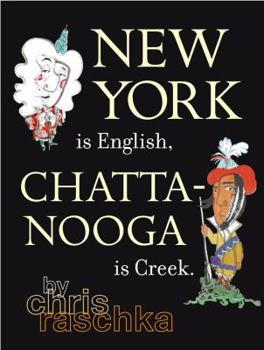New York Is English, Chattanooga Is Creek
Select Format
Select Condition 
Book Overview
Suppose you are a CITY. Yes, you, looking at this book. Who named you SANTA FE, or PORTLAND, or TOMBSTONE, or whatever your name is? This book invites you to a big party with lots and lots of... This description may be from another edition of this product.
Format:Hardcover
Language:English
ISBN:0689846002
ISBN13:9780689846007
Release Date:January 2005
Publisher:Atheneum Books
Length:40 Pages
Weight:1.20 lbs.
Dimensions:0.4" x 9.4" x 12.4"
Age Range:4 to 7 years
Grade Range:Preschool to Grade 2
Customer Reviews
2 ratings
4 1/2 A Mad Hatter, Metropolitan Smatter...Gather Together to Patter and Chatter
Published by Thriftbooks.com User , 18 years ago
For decades now, San Francisco theatregoers have been treated to the burlesque musical comedy of "Beach Blanket Babylon," the highlight of which may be the entrance of a woman wearing an enormous hat upon which one sees enduring symbols of the San Francisco cityscape. I don't know if this show inspired the creative and daring artist Chris Raschka's concept and his stylized ink and watercolor illustrations (he's already an original), but he similarly depicts various iconographic persons representing the origin of various American city names, while sporting hats with prominent that city's buildings and symbols. New York anchors this pageant of American cities, and Raschka returns to the Big Apple to establish plot turns. A foppishly dressed Duke--wearing a model of the Chrysler Building on his wig-- represents New York, and his tea drinking and powdered wig remind us (repeatedly, as in a rhyme) that "New York is English": "The nobleman he's named for was, after all, a duke. The Duke of York he was, became James the Second, the King of all England. Imagine! A king!" There's no mention of the prominent Dutch settlers, or, indeed, of the thousands of immigrants who made New York what it is, but this is an etymology only--just who were these cities named after? Similarly, we have "Minneapolis, part Sioux. Minneapolis, part Greek," without a mention of European and Scandinavian settlers. New York throws a party for a census of American cities, including Chattanooga, Minneapolis, El Paso, "Spanish" San Francisco (you can see the Transamerica building and Coit Tower on his head); English, Scottish, Latin and Welsh Pittsburgh, PA; and a host of other hat-wearing cities from other Native American sources. A partial list includes Cheyenne (Dakota), Chicago and Ashtabula Milwaukee (Algonquin), Seattle (Salish), Schenectady (Iroquoi), and Tuscaloosa (Choctaw). Raschka describes the get-together: "The first few minutes were quiet. Dutch Brooklyn stood with French Des Moines. "Broken land" next to "of the monks" Well, you can imagine." Some of the references are pretty obscure, but an introductory "Guest List" explains the connections in an entertaining breezy style. (The narrative's "Miami was motherly," stems from the conjecture that "Miami could be the Ottowan word for mother... We just don't know for sure.") The tired looking guests leave the successful party, and Raschka parts with a simple message: "A thousand names, a hundred languages, a million, and a million, and a million people name one language. The cities return to their beds, and, as on the frontispiece, we see a map of the United States showing us where the "city persons" live. Well, that's the plot, but the real question for me is whether and for whom this unconventional story works. I think it does, but only for a fairly narrow audience, say 2nd through 4th graders. The wit of Raschka's often-breezy portraits, and the tiny city symbols atop the hats will be lost on many yo
City Names Inspire Language Fun
Published by Thriftbooks.com User , 18 years ago
When New York decides to throw a party, lots of language fun--and cultural awareness--begin. I'd call Chris Raschka's book a kissing cousin to Laurie Keller's "Scrambled States of America" (whose conceit is so clever I made my husband read it) and "Double Trouble in Walla Walla" by Andrew Clements (whose goofiness reviewers don't seem to appreciate but second and third graders sure do). Raschka's style is different from both. Kindship comes from inviting readers to take a second look at names we hear all the time but don't really know anything about, words like New York and Amarillo and Tuscaloosa. From poking gentle fun at Chicago, with its name meaning 'stinking onions,' to Buffalo, for hoping its name is from the French and not the Bison, Chris Raschka gives children a book that entertains and educates. Adults will learn lots too.





